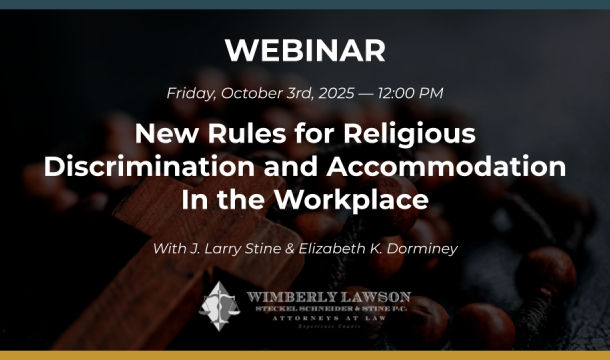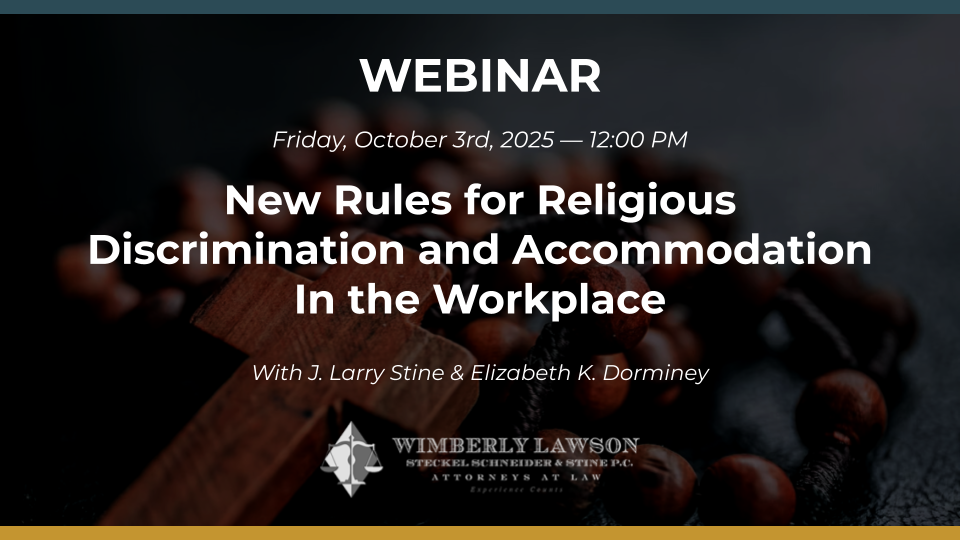Employees Can Bring Guns to Work in Georgia—But Who is Liable if They Use Them? The Georgia Supreme Court Says the Employer May Be Liable.
The Georgia Supreme Court just complicated the issue of employee possession of guns in the workplace for Georgia employers. In Lucas v. Beckman Coulter, Inc., (Georgia Supreme Court Case No., No. S17G0541, 3/5/18), the Georgia Supreme Court held that OCGA § 16-11-135 (e) , which is part of the Business Security and Employee Privacy Act, (also affectionately known as the "Bring Your Guns to Work Law") does not grant immunity "from firearm-related tort liability" to an employer who was sued for liability for the allegedly negligent acts of its employee under the theory of respondeat superior, and for the employer's alleged negligent supervision.
The case involved an employee, Jeremy Wilson, who accidentally shot another employee, Claude Lucas, with his handgun while they were out on a customer call. Wilson normally kept his handgun in his car, but he took it with him on the customer call when he heard that there were a number of thefts from vehicles in the customer's parking lot. The company had a policy prohibiting employees from transporting firearms while on company business.
At the time of the shooting, OCGA § 16-11-135 (e) read as follows:
No employer, property owner, or property owner's agent shall be held liable in any criminal or civil action for damages resulting from or arising out of an occurrence involving the transportation, storage, possession, or use of a firearm, including, but not limited to, the theft of a firearm from an employee's automobile, pursuant to this Code section unless such employer commits a criminal act involving the use of a firearm or unless the employer knew that the person using such firearm would commit such criminal act on the employer's premises. Nothing contained in this Code section shall create a new duty on the part of the employer, property owner, or property owner's agent. An employee at will shall have no greater interest in employment created by this Code section and shall remain an employee at will.
The trial court and the Court of Appeals found that this provision insulated the company from liability for Wilson's shooting. The Georgia Supreme Court, however, disagreed. It held that this Code section does not immunize an employer for all damages arising out of an employee's transportation, storage, possession, or use of a firearm. Instead, it held that "the intent of subsection (e) is to exempt employers from liability that might arise by complying with the Code section's prohibition against maintaining a policy of searching an employee's own vehicle (or those of guests) on the employer's parking lot or its prohibition against conditioning employment on an employee's agreement not to bring firearms into the parking lot in the employee's own vehicle, even when they are locked out of sight by an employee who possesses a weapons carry license." In other words, this statute insulates an employer from liability only for actions taken to comply with the law's intent to allow employees to keep firearms in their locked vehicles free of the threat of a search or losing their job. That's a big difference.
Bottom line: OCGA § 16-11-135 (e) does not give employers blanket immunity from liability for torts committed by their employees with guns.
Pro tip: In light of this new decision, Georgia employers should review their policies and practices regarding employee possession of guns in the workplace. Georgia law provides that employers cannot prohibit employees from bringing guns to work as long as the employees leave them locked in their private vehicles in the parking lot. However, private property owners in Georgia can prohibit people from bringing firearms onto their property. Keep in mind that the employee, in this case, was not on the employer's premises but was out on company business, so those situations need to be addressed as well.
And remember: a written policy is no good unless the employer actually enforces it.

Kathleen J. Jennings is a former principal in the Atlanta office of Wimberly, Lawson, Steckel, Schneider, & Stine, P.C. She defends employers in employment matters, such as sexual harassment, discrimination, Wage and Hour, OSHA, restrictive covenants, and other employment litigation and provides training and counseling to employers in employment matters.
Related Content
Get Email Updates
Recent Content

Trump Nominates Appointments to NLRB and EEOC but Policy Changes Likely to Be Delayed

DOL Launches Self-Audit Programs Designed to Help Employers Improve Compliance

DOL Must Release EEO-1 Reports to the Public under Open Records Laws

Current Advice on Active-Shooter Situations

New Policy for Federal Workers and Religious Expressions

